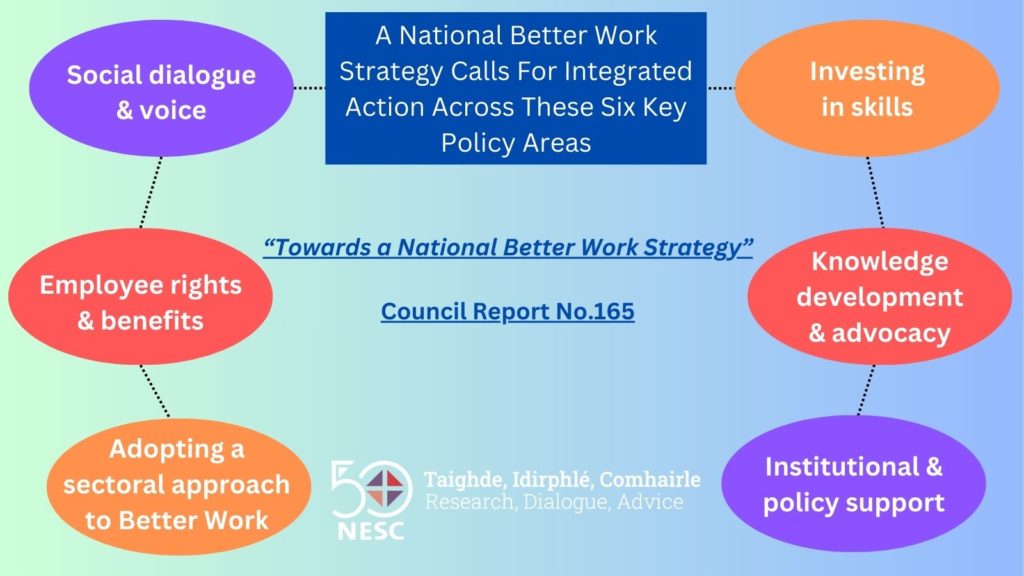You are here: Home > Our Work > Good Jobs, Transition and Better Work
Good Jobs, Transition and Better Work
Making Work Better

A Council Report, “Towards a National Better Work Strategy,” based on the programme of research below has been published. Read the press release also.
While Ireland’s labour market has demonstrated remarkable resilience and dynamism in the post-covid era, reaching record levels of employment, this project explores the case for a concerted policy focus on ‘Making Work Better’. The potential economic and social value of Better Work was highlighted in the Council’s work on managing the transition to a low-carbon society and more digital future (NESC, 2019). Further, in its recent report ‘Understanding the Irish Economy in a Time of Turbulence’ (2023), the Council contends that acting and investing to make work attractive is one of the three core areas of economic action and ambition that will help ensure that Ireland continues to transition towards its shared vision and the enhanced economic resilience that it encompasses.
In seeking to build on these studies, this project defines and outlines the thinking behind ‘Making Work Better’. This study draws on policy and academic literature that uses terms that are analogous to ‘making work better’ such as ‘quality jobs’; ‘good jobs’; ‘fair work’; and ‘decent work’. It is argued however that the concept of ‘better work’ captures the importance of making work better for all employees and employers, and across all sectors of the economy. Equally it more accurately reflects the dynamic, evolving, context-specific and open-ended nature of this process. In other words, making work better is a journey rather than a destination.
Drawing on international and national research and specific policy actions and measures that have been introduced to support Better Work in Ireland, Scotland and Wales, this project aims to set out the case for concerted policy focus on making work better including:
- Why making work better is good for employees;
- The potential dividends for employers of improving the quality of work;
- The broader economic and societal dividends of investing in Better Work, and the societal costs associated with lower quality jobs;
- The challenges of improving productivity in people-centred services (e.g. long-term care) and the role of job quality in enhancing service provision;
- How making work better can shape the provision of quality public services; and
- The political and democratic dimensions of making work better.
Finally, this study also aims to identify an integrated set of practical policy actions and tools that can support the aim of making work better for all workers across all sectors of the economy.
Watch a presentation delivered by Stefanie Stantcheva (Harvard University) here.
Stefanie Stantcheva is the Nathaniel Ropes Professor of Political Economy at Harvard, founder of the Social Economics Lab, and a global expert on the subject of ‘Good Jobs’. Stefanie kindly took the time to record the above video late last year, in the leadup to our NESC@50 Conference. Her presentation supports and strengthens the findings of ‘Towards a National Better Work Strategy.’
Good Jobs & Transition
In 2020 the Council produced a significant report on the impact on employment of the transition associated with climate change and digital automation. One finding was the importance of quality work and good jobs as critical in tackling vulnerability for sectors, firms and workers. A subsequent piece of NESC research showed how Covid-19 brought new vulnerabilities to light and re-emphasised some pre-existing ones. It has forced a reappraisal of what are often termed ‘good jobs’ and how work is valued. NESC continued to research these issues and in 2021 published a Secretariat Paper on the ‘Good Jobs Agenda’ as part of its ongoing work for the Shared Island Initiative. This paper identified the ‘good jobs’ agenda as a concerted policy drive to improve the quality and productivity of work as well as the experiences, incomes and standard of living of workers. This agenda is focused on discovering the suite of measures and actions that will improve job quality within the labour market. Drawing on interviews with stakeholders in Ireland and Northern Ireland, it found that there is strong support for an all-island approach to ‘good-jobs’.
